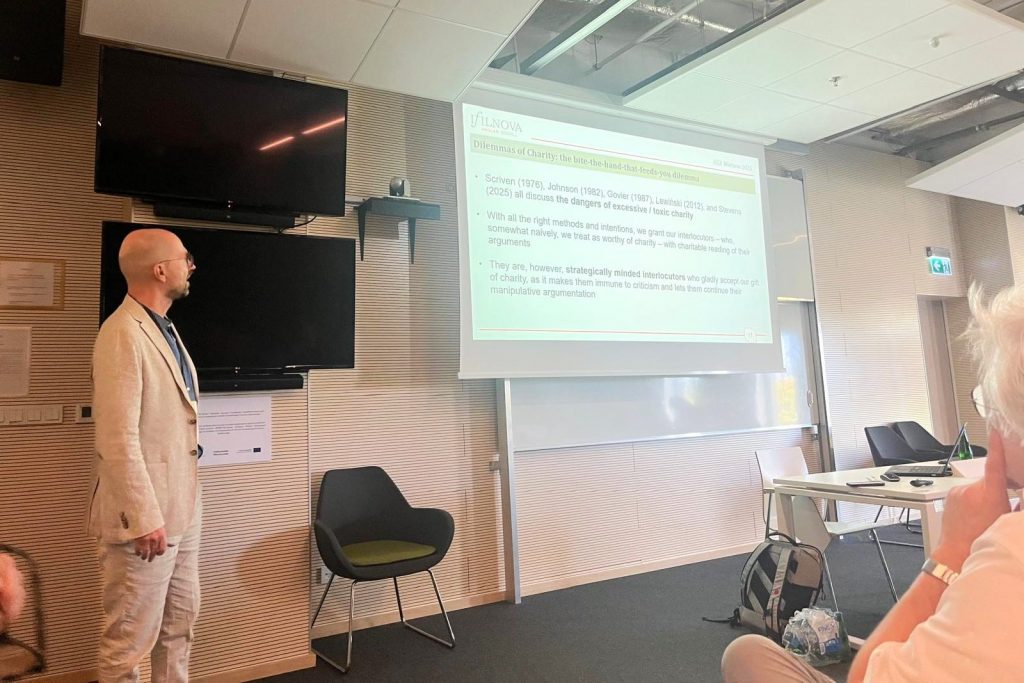
The future of arguing: power, persuasion, and technology
The European Conference on Argumentation recently held its fifth edition. This time, the conference took place in Warsaw, Poland, from 23 to 26 September. First launched in Lisbon and held every two years, the conference brings together a large number of argumentation scholars from all over the world and across a wide range of disciplines. With a different theme in each edition, the special theme of this year’s conference was Argumentation in Digital Society. In addition, the plenary lectures were delivered by renowned scholars such as Dawn Archer (Manchester Metropolitan University, Manchester, UK), Jean Goodwin (North Carolina State University, Raleigh, US), and Miriam Metzger (University of California, Santa Barbara, US).
At this conference, three members of MultiPoD from NOVA University of Lisbon, Amalia Haro Marchal, Marcin Lewiński, and Mehmet Ali Üzelgün, had the opportunity to attend and present their work.
Challenging the neutral view of argumentation
Amalia Haro Marchal gave a talk titled Argumentative Resistance and Non-Ideal Argumentation. In her talk, she presented a paper that challenges the so-called neutral view of argumentation, according to which all participants enter argumentative exchanges on an equal footing. Drawing on feminist argumentation theory, she argued that power dynamics shape who gets to speak and what counts as a legitimate contribution to argumentative interactions. Within this framework, she introduced the concept of argumentative resistance characterized as a discursive strategy employed by marginalized and oppressed individuals in argumentative settings governed by unjust norms. Furthermore, she argued that far from being irrational or uncooperative, these forms of resistance challenge the prevailing norms of argumentative exchange and expose the underlying injustices.

Rethinking how we interpret others: the Dilemmas of Charity
Marcin Lewiński delivered two talks. The first, titled Dilemmas of Charity in Argumentation, presented a paper discussing the Principle of Charity, characterizing it as a methodological guideline for adopting the strongest possible reconstruction of an argument. He raised questions concerning when and how this principle can be applied consistently, arguing that in contexts such as strategic online communication, the applicability of the principle of charity is limited. In his talk, he also introduced and defended what he called the Conceptual Unity Perspective on the Principle of Charity, which emphasizes the continuity of the principle across the disciplines of philosophy of language and argumentation theory.
Can AI argue? Testing Large Language Models (LLMs) and explanation
In his second talk, Arguing with ChatGPT: Large Language Models and the Inference to the Best Explanation, co-authored with other argumentation scholars (Annette Hautli-Janisz, Petar Bodlović, and Álvaro Domínguez-Armas), they presented a proposal consisting in testing the ability of Large Language Models (LLMs) to engage in quality argumentative interactions with users. They presented an analysis of five dialogues with ChatGPT 4.0, where the model was prompted to produce Inferences to the Best Explanation (IBEs) through a sequence of user questions and critiques of its responses. Their study shows that GPT not only produces well-articulated and reasonable text, but it also generates explanations and justifications proactively, without being explicitly instructed to do so.
How social media turns crises into public arguments
Finally, Mehmet Ali Üzelgün, in his talk titled Between the Concrete and the Abstract: Accusations, Values, and Positions in a Post-Disaster Controversy, introduced the idea that social media platforms have become privileged spaces for extending criticism, as well as for providing justifications and forming opinions on matters of public concern. He further argued that, thanks to platform algorithms, virtually any issue can be transformed into a controversy. Drawing on recent proposals in argumentation studies concerning macro-scale arguments, he argued that such arguments can work as a useful tool for analyzing specific debates and controversies. To illustrate this, he examined how positions are negotiated in a post-disaster context of controversy, focusing on the social media debate around the 2017 Pedrógão Grande wildfire in Portugal—the deadliest disaster in the country’s recent history, which had significant political consequences, including high-level resignations.